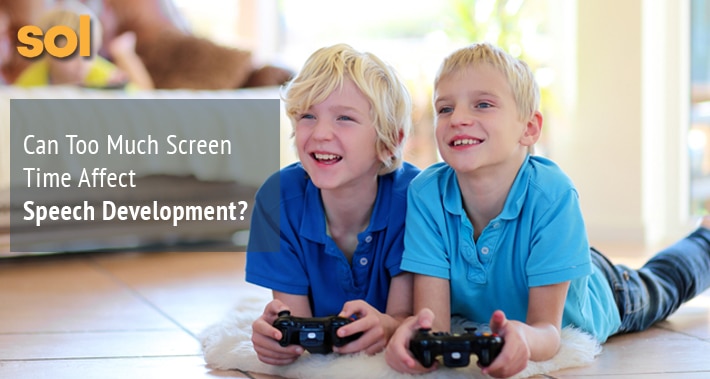
Is your child spending more time in front of a screen than you’d like?
Or are you concerned that the amount of time your child spends in front of a screen is affecting their ability to meet their speech development milestones?
Have you noticed that your child is less talkative since they started spending every moment you let them on their tablet?
If so, your child might benefit from pediatric speech therapy services.
Speech and language therapy can help your child with their communication challenges, contrary to many myths about speech therapy.
Read on to find out more about the effects of screen time on a child’s language skills, and how our speech-language pathologists can help.
Active Vs. Passive Screen Time
Broadly speaking, there are two different kinds of screen time – active and passive.
They both have different effects on your child’s growing brain.
Active screen time is when the child has something to do in response to the content on the screen.
Some educational apps that involve two way communication or language practice are examples of active screen time because your child can participate in the conversation through the screen.
Chatting with family, friends, or playgroups on a video call is also an example of active screen time, because your child has the chance to meaningfully engage with the other people on the call.
Active screen time encourages your child to interact and gives them exciting stimuli to respond to, which supports their creativity.
Active screen time also works in the practice of mindfulness, because it’s encouraging someone to be in the moment instead of a passive observer.
Passive screen time, on the other hand, is defined as “passively” consuming content with little interaction or engagement.
Leaving your child to watch television on their own or giving them your phone or tablet so they can watch videos online are examples of passive screen time.
With passive screen time, there’s less creativity or original thought involved, and children aren’t encouraged to physically or mentally engage with what they’re watching.
How Can Screen Time Affect Speech Development?
Researchers have studied the effects of passive screen time extensively and have found that passive screen time is linked to delays in language development in young children.
A study by Zimmerman, Christakis, and Meltzoff analyzed the effects of media exposure on over a thousand toddlers under two years old.
They found a strong correlation between media consumption and language development.
The more videos that toddlers watched, the fewer words they knew or said.
The study also found that for each additional hour of videos that young children consumed, they said on average six to eight fewer words.
The same study showed that before a child’s first birthday, those that watched more than two hours of television a day were six times more likely to develop a language delay.
The study demonstrated that the more time children spent using handheld screens, such as tablets, phones, and electronic games, the more likely they were to develop a speech delay.
More specifically, each additional 30 minutes they spent consumed by these devices translated into a 49% increase in the likelihood of delayed speech development.
Delaying their speech development can also make it more difficult to determine if your child has a speech or language disorder.
Not only that, but another study tied excessive screen time early in life to lower cognitive skills later in life.

How To Break Screen Time Addiction In Children
If you’re concerned that your child’s passive screen time is contributing to their language development problems, it’s not the end of the world.
There are some great strategies you can use to help break screen time addiction.
The primary way to support your child’s language development is by talking to them.
Talk to your child all the time: talk about the things you see when you’re out for a walk together, or talk about the different foods in a grocery store when you’re shopping.
Reading to your child has a similar beneficial effect on developing their language skills.
Even if your child is too young to reply using words, keep talking to them.
They will learn new words from you that they’ll begin to use.
You can also try using natural teaching strategies with your child at home.
Another good strategy to try is playing offline games with your child.
Take the opportunity to learn new card or board games, or even language games if you would like to keep focusing on your child’s language skills.
Different toys and games you can use to help develop speech and language skills include:
- Potato Head
- A toy bowling set
- Blowing bubbles (yes, really!)
- The learning piggy bank
Keep reading for more detailed guidelines for managing your child’s screen time as they grow.
Recommended Guidelines For Screen Time
Below, you’ll find some recommendations on how much screen time to offer your kids.
1. Birth To 18 Months
For very young children, it’s best to avoid screen time entirely.
You can make an exception for video chatting with family or if you’re attending an online playgroup, but make sure an adult is with your child when they do.
2. To Age 2
You can start introducing digital media to your toddler at this age.
However, it’s important to limit their screen time.
Be sure to choose high quality educational programming you can watch with your child so you can explain what’s on screen and ask stimulating questions throughout.
3. Age 2 To 5
During this key developmental stage, experts recommend limiting non educational screen time to approximately one hour a weekday and three hours on the weekends.
As before, try to remain engaged and watch television or play games together with your child.
This will give you an opportunity to help your child connect what’s on screen to the real world.
4. Age 6 And Up
Continue to limit your child’s media diet and encourage healthy habits.
Keep track of how much screen time they have to make sure it’s not interfering with their school work, sleep, or other physical activities essential to raising a healthy kid.
Book Your Appointment With Sol Speech And Language Therapy Today
Would you like to know more about how to balance your child’s screen time with healthy language development?
Or would you like to meet with a professional to help grow your child’s language skills and reduce their anxiety?
If so, book an appointment with Sol Speech And Language Therapy today to schedule a speech therapy evaluation.
Speech therapy services can be delivered in person at either our Austin clinic and Round Rock clinic, or through online speech therapy.
Speech therapy delivered online is an example of active screen time and will improve your child’s language skills.
With online speech therapy, children are actively engaged and participatory, sitting face to face with their speech therapist to practice speech and language skills.
Book your appointment with Sol Speech And Language Therapy today.
6448 E Hwy 290 Suite E-108,
Austin, TX 78723
(512) 368-9488
» https://g.page/r/CfRfhOpEQm7BEAE
Sol Speech & Language Therapy
555 Round Rock W Dr E-221,
Round Rock, TX 78681
(512) 808-3953
» https://g.page/r/Cb5pwCTosSEfEBM
Sol Speech & Language Therapy offers personalized skilled intervention to those struggling with their speech and language skills. Services offered include screening, consultation, and comprehensive evaluation. We also provide one-on-one and/or group therapy for speech sound disorders, receptive/expressive language delay/disorder, stuttering/cluttering, accent reduction, and much more.